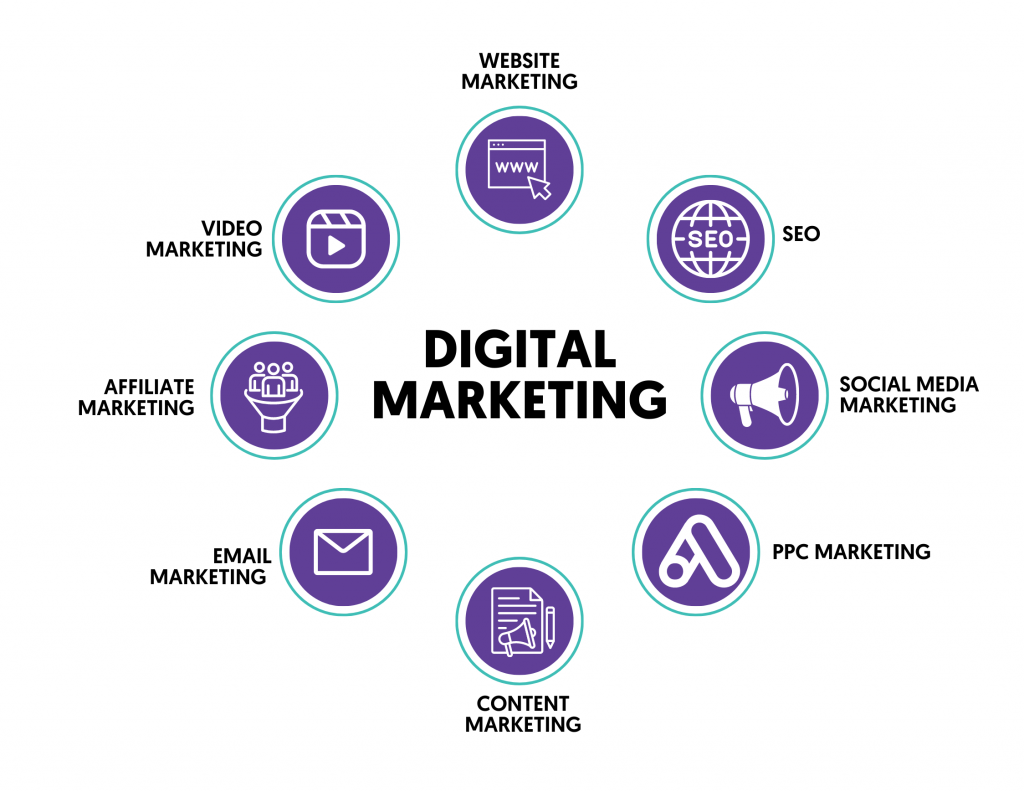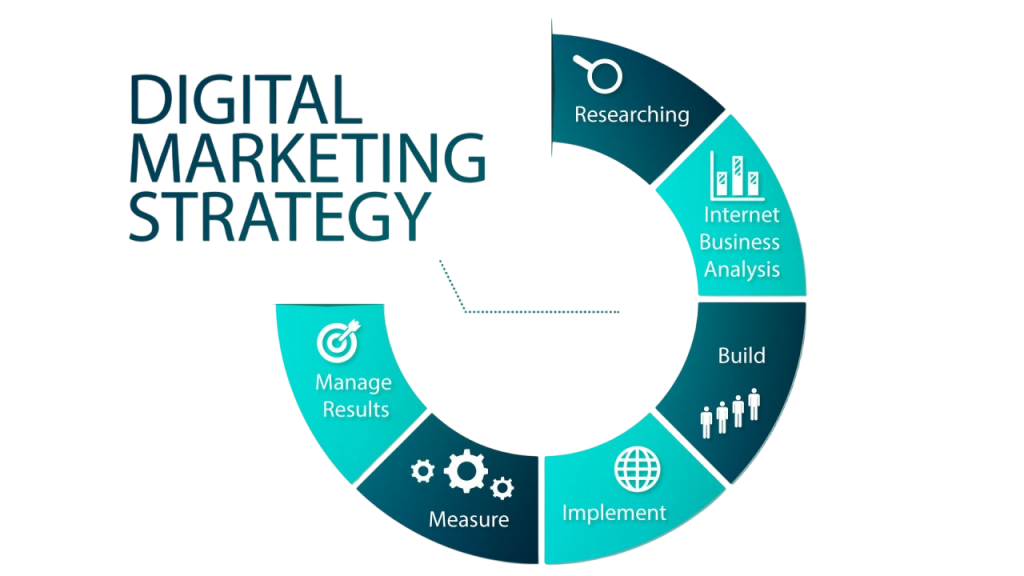
- Introduction
- What is Digital Marketing?
- Why Learn Digital Marketing?
- Key Channels of Digital Marketing
- Digital Marketing Tools You Should Know
- How to Build a Digital Marketing Strategy
- Digital Marketing Metrics and KPIs
- Digital Marketing Career Opportunities
- Conclusion
Introduction
Over the past ten years, there has been a significant change in the marketing industry. These days, Digital Marketing Tutorial serves as the foundation for sales, brand development, and consumer acquisition. Whether you’re a student, small business owner, or someone trying to change careers, knowing how digital marketing operates is an important and essential ability. You will get a thorough rundown of all the ideas, resources, and tactics utilized in modern Digital Marketing Training from this lesson. Digital marketing is the practice of promoting goods and services to customers through digital platforms, channels, and technology. It entails connecting with both present and potential clients by utilizing the internet and electronic gadgets, including PCs, smartphones, and tablets. Digital marketing, unlike traditional marketing that relies on print, radio, or television, enables real-time interaction and precise targeting. Search engine optimization (SEO), content marketing, social media marketing, email marketing, pay-per-click (PPC) advertising, and mobile marketing are all essential elements of digital marketing. These tactics assist companies in raising their internet presence, generating leads, increasing website traffic, and eventually increasing sales. Reaching a worldwide audience at a relatively low cost is one of the main benefits of digital marketing. Additionally, it enables companies to rapidly modify ads based on performance data, personalize content, and evaluate customer behavior. Traditional marketing techniques cannot provide this degree of control and flexibility. Businesses of all sizes must have a strong online presence in the current digital era. Digital marketing is still a dynamic and effective tool for increasing brand awareness, interacting with customers, and accomplishing corporate objectives in a cutthroat market as technology advances.
Ready to Get Certified in Digital Marketing? Explore the Program Now Digital Marketing Online Training Offered By ACTE Right Now!
What is Digital Marketing?
Any type of marketing that uses digital platforms and channels is referred to as digital marketing. This covers everything from email, mobile apps, and digital advertisements to websites, search engines, and social media. Reaching and interacting with target audiences online is the primary objective in order to encourage activities like purchases, sign-ups, or brand exposure. The process of using digital technologies and internet platforms to promote goods, services, Digital Marketing vs Social Media or brands is known as digital marketing. It encompasses all marketing initiatives that communicate with current and future clients via electronic devices or the internet. Digital marketing, as opposed to traditional marketing (such as print, radio, or television advertisements), enables companies to communicate directly with customers via platforms like:
- Websites
- Search engines (e.g., Google)
- Social media (e.g., Facebook, Instagram)
- Mobile apps
- Online ads (e.g., Google Ads, social media ads)
Digital marketing is data-driven and allows for precise targeting, real-time tracking, and personalized communication. For example, businesses can show specific ads to users based on their browsing history, location, or interests.
Why Learn Digital Marketing?
Learning digital marketing is essential in today’s technology-driven world, where businesses and individuals rely heavily on online platforms to reach their audiences. Here are some key reasons to learn digital marketing:
- High Demand for Digital Skills: Digital marketing is one of the fastest-growing industries. Businesses of all sizes need skilled digital marketers to help them grow online, making it a valuable and in-demand career path.
- Diverse Career Opportunities: Digital marketing offers a wide range of job roles, Google Ranking Factors such as:
- SEO Specialist
- Content Marketer
- Social Media Manager
- PPC Expert
- Email Marketer
- Digital Analyst
- Cost-Effective and Measurable Marketing: Compared to traditional marketing, digital marketing enables companies to reach wide audiences at a lesser cost. Additionally, it offers real-time data for quick strategy adjustments and success measurement.
- Flexibility and Creativity: The discipline blends artistic abilities such as writing, design, and video production with data analysis. Additionally, a lot of jobs provide remote work and other flexible work arrangements.
- Develop Your Own Company or Brand: Digital marketing abilities may help you draw clients, create leads, PPC Analyst Salary and boost online sales whether you manage a company or wish to develop your own personal brand.

Key Channels of Digital Marketing
Let’s explore the main components you need to understand and master to become proficient in digital marketing.
- Search Engine Optimization (SEO): SEO is the process of optimizing your website so that it ranks higher on search engines like Google. It includes on-page SEO (content and keyword optimization), off-page SEO (backlinks and authority), and technical SEO (site speed, mobile-friendliness, indexing). SEO is essential for gaining organic, unpaid traffic and building long-term visibility.
- Pay-Per-Click (PPC) Advertising: PPC is a model where advertisers pay each time someone clicks on their ad. Google Ads is the most popular platform for PPC campaigns. PPC can deliver immediate traffic and results, Digital Marketing Tutorial especially for competitive keywords or when launching new products. It requires keyword bidding, quality score optimization, Benefits of Digital Marketing and conversion tracking.
- Social Media Marketing (SMM): SMM involves using platforms like Facebook, Instagram, LinkedIn, X, and TikTok to engage with audiences, share content, and run ads. Organic social media builds community and brand personality, while paid social media can precisely target audiences based on demographics, interests, and behavior.
- Content Marketing: Content marketing focuses on creating valuable, relevant content to attract and retain users. This includes blogs, videos, infographics, podcasts, whitepapers, and more. Good content builds trust, drives SEO, and supports other marketing channels by educating or entertaining your audience.
- Email Marketing: Email marketing is one of the most effective ways to nurture leads and maintain customer relationships. It involves building a subscriber list and sending targeted campaigns with promotions, updates, or content. Email has a high ROI and allows for advanced personalization and automation.
- Affiliate Marketing: Affiliate marketing allows individuals (affiliates) to promote a brand’s products or services in exchange for a commission. It’s performance-based and works well when you partner with content creators, bloggers, or influencers who already have a built-in audience.
- Influencer Marketing: Influencer marketing uses the popularity and trust of digital influencers to promote your products or brand. It can be used across platforms and works well for lifestyle, beauty, fitness, and tech brands looking to build social proof.
- Define Your Objectives: Set clear goals like increasing traffic, Digital Marketing Made Simple generating leads, or boosting sales.
- Understand Your Audience: Create detailed buyer personas. Know their needs, challenges, and digital habits.
- Choose the Right Channels: Select the platforms that align with your target audience.
- Plan Your Content: Create a content calendar and tailor messages to each stage of the buyer’s journey.
- Allocate Budget: Distribute your budget across channels based on expected ROI.
- Implement Campaigns: Launch and monitor your campaigns using appropriate tools and platforms.
- Measure and Optimize: Track performance metrics and continually refine your approach.
- SEO Specialist
- Content Marketer
- PPC Specialist
- Social Media Manager
- Email Marketing Manager
- Digital Marketing Analyst
- E-commerce Marketing Manager
To Explore Digital Marketing in Depth, Check Out Our Comprehensive Digital Marketing Training To Gain Insights From Our Experts!
Digital Marketing Tools You Should Know
Effective planning, execution, and measurement of marketing initiatives are critical components of digital marketing success. For monitoring website traffic and comprehending user behavior, Google Analytics is essential. Two effective tools for managing paid advertising campaigns are Google Ads and Facebook Ads Manager. Marketing professionals can schedule posts, monitor activity, and oversee numerous accounts on social media with the help of apps like Hootsuite, Buffer, Digital Marketing Training , email marketing and later. A lot of people use Canva and Adobe Creative Cloud to make visually appealing graphics and material. Popular SEO tools for competitor analysis, site audits, and keyword research include SEMrush, Ahrefs, and Moz. Email campaign management and communication automation are facilitated by Mailchimp, Constant Contact, and Sendinblue. Tools such as Trello, Asana, and others are useful for content preparation and teamwork.
How to Build a Digital Marketing Strategy
To succeed in digital marketing, you need a strategy that aligns with your business goals.

Looking to Master Digital Marketing? Discover the Digital Marketing Expert Masters Program Training Course Available at ACTE Now!
Digital Marketing Metrics and KPIs
KPIs (Key Performance Indicators) and digital marketing metrics are essential for gauging the efficacy and success of Digital Marketing Tutorial initiatives. They assist marketers in making data-driven decisions to enhance outcomes and offer insights into how effectively tactics are working. Website traffic, which indicates how many people are viewing your site, is one of the most fundamental yet significant indicators. The bounce rate, which shows the proportion of viewers that depart after only viewing one page and is frequently an indicator of subpar content or user experience, is closely connected. Another important indicator is conversion rate, Pay-Per-Click Explained which quantifies the proportion of visitors who complete a desired activity, like buying something or completing a form. Metrics like cost per click (CPC) and click-through rate (CTR) are crucial for assessing the effectiveness and cost-efficiency of paid advertising. Businesses can learn how much they’re spending to acquire new clients and whether their efforts are successful by using customer acquisition cost (CAC) and return on investment (ROI). Open and click rates for email marketing indicate how well your messages captivate recipients. Since engagement rate shows how users connect with your material, it is essential for social media marketing. When combined, these KPIs and indicators assist marketers in maximizing return on investment, streamlining campaigns, and coordinating their endeavors with corporate objectives.
Digital Marketing Career Opportunities
Digital marketing offers diverse career paths, including:
Preparing for Digital Marketing Job Interviews? Have a Look at Our Blog on Digital Marketing Interview Questions and Answers To Ace Your Interview!
Conclusion
Digital marketing is no longer optional; it’s an essential part of any successful business strategy. From SEO and PPC to content and email marketing, each element plays a role in attracting and converting customers online. This tutorial has covered the basics, but digital marketing is a constantly evolving field. To succeed, commit to learning continuously, testing new strategies, and staying updated on trends. Whether you’re pursuing a Digital Marketing Training career or aiming to grow your own business, these fundamentals are your starting point. In today’s digital-first world, understanding and applying the right digital marketing metrics and KPIs is essential for success. These measurable indicators allow marketers to track performance, evaluate the effectiveness of their strategies, and make informed decisions based on real data. Whether it’s increasing website traffic, improving conversion rates, or maximizing ROI, each metric provides valuable insights that help refine and optimize marketing efforts. By consistently monitoring and analyzing these key metrics, Digital Marketing Tools businesses can achieve better results, reach their target audience more effectively, and stay competitive in a rapidly evolving digital landscape.




